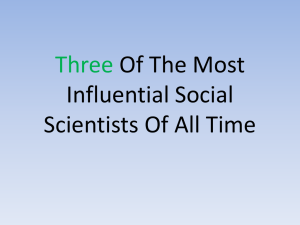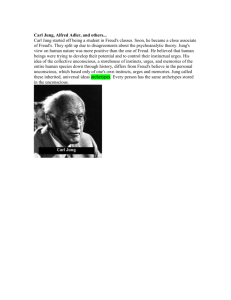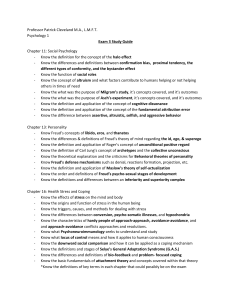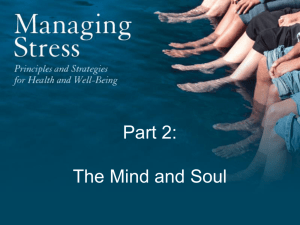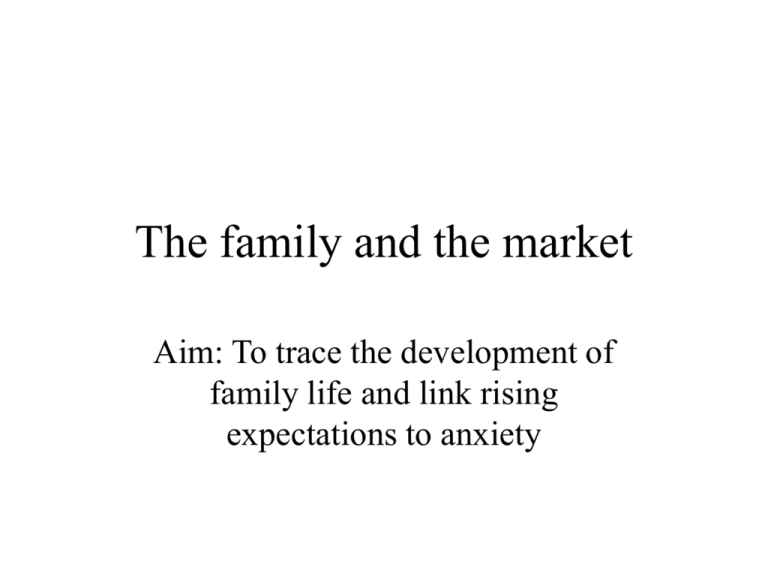
The family and the market
Aim: To trace the development of
family life and link rising
expectations to anxiety
The effect of the market on
family
• In pre-capitalist societies the family is the
primary site of production, which is also
based on land ownership
• The extension of market and technology
based systems of production lead to the
outsourcing of production formerly done in
the home (especially by women, who are
traditionally cheaper labour)
Some terms
• Sex and kinship are biological concepts
• Gender is the display of sex related behaviour
which the society requires
• Feudal governance structures are built primarily
around kinship (family) loyalties
• Democratic societies claim to reward individual
merit and often see kinship governance forms as
corrupt or discriminatory
More terms
• Feudal ideology sees family loyalty as leading to
the overall good
• Market ideology sees individual freedom as
leading to the overall good
• Socialist ideology sees subjugation of individual
freedom to the overall good as necessary
• (I personally would not vote for family ideology)
Capitalism and ‘private life’
• The early development of capitalism produced
consumption for a home life away from the
workplace, and also for a ‘private’ life, depending
on leisure and wealth
• In wealthy families, the control of women by men
was justified by the view that it is necessary to
protect a weaker sex and their offspring, and that
women find this a welcome bargain
In the 19th century Engels puts
another view
• He saw marriage primarily as a family
based property alliance by the wealthy
• He thought that increasing productivity
would eventually lead to all women being
drawn into an ever-expanding market, and
also becoming increasingly equal with men
because of their new found economic
independence
Parsons and the feminists
• As capitalism developed in the 20th century,
people traveled more and had fewer children so
the nuclear family replaced the extended one
• Parsons saw modern marriage as a welcome
bargain between the sexes – the male role is
primarily instrumental, the female is expressive
• Feminist writers tended to be gloomier than
Engels, and to see women as biologically based
captives of a man made market
Discrimination
• The concept of discrimination is based on the idea
that individuals deserve equal opportunities and
choices, regardless of their gender, ethnicity, etc.
• A society that embraces freedom from
discrimination should also embrace a concern for
the care of children and other vulnerable life.
• If not, the primary concerns of adults will
otherwise be driven by the market, not traditions
which necessitate the care of the next generation.
Looking inside the self
The psychoanalytic and psychological
traditions at the beginning of the 20th
century began a new interest in the
individual and interior life
Freud saw infants as instinctive, primarily
sexual beings whose rapacious appetites
require civilizing within the family at an
early age
Freud
His theory of the unconscious mind and the
nature of the id, the ego and the superego
became extremely influential
The id is instinctual, uncontrolled behaviour
The ego develops in response to an
understanding of self preservation needs
Superego development entails gaining a
broader moral and social view
Freud and followers
• Freud thought civilization was very fragile and
easily overwhelmed by our innately aggressive
animal nature
• Writers after world war II emphasized the
importance of mothering and social bonds instead.
They claimed that selfish aggression, rather than
being an innate drive, owes its existence to the
unmet demand for love.
Jung
Jung was a disciple of Freud but became his critic, as
had many others earlier.
He saw contemporary 20th century economic,
political and scientific approaches to the world as
extremely powerful but based on comparatively
crude and limited perspectives, designed primarily
to serve narrowly utilitarian scientific and
commercial purposes.
Jung
Jung thought that the cold war provided
strong evidence that the world was mad,
and motivated by fear and hate, rather than
the broader love of humanity, as its major
ideologies and religions claimed.
He put the problem down partly to a refusal to
examine the dark side of the self, but to
instead project it onto the other.
The protest generation
• Marcuse argued that the development of
capitalism made people become
increasingly self-obsessed. He thought that
the productivity of capitalism had
successfully diverted the social reality of
comparative powerlessness into an
unsatisfying individual consumption of
goods and services. We must see ourselves
as products which are for sale in the market.
The Narcissistic Society
• The ‘narcissistic’ or ‘consumer’ society
commencing in the sixties and beyond is one
where the individual is engaged in an anxious,
continual and self-destructive quest for selfidentity and self-gratification.
Constant anxiety about whether one can ‘measure
up’ to peer or related group requirements produces
the ‘lonely crowd’ and ‘other directed’ personality.
(Does my bum look big in this?)
The feminists
• De Beauvoir pointed out that in a world
constructed and controlled by men, women could
only see themselves through male eyes
• Freidan mainly argued that society would be better
off if women were treated equally, especially at
work
• Greer pointed to historical and contemporary
evidence of men’s hatred and oppression of
women, with sexual expression being seen as a
major site of control
The feminists
Ehrenreich argued that the fashionable 1960s
horror of conformity came partly from a
male rejection of providing for an
essentially dependent group – the wife and
kids. She also saw it as the logical
byproduct of the capitalist ideology of
competitive individualism, which also
undermines traditional family life.
Lasch
• Lasch argued that after the political turmoil of the
sixties people withdrew into ‘psychic selfimprovement’ and learning to ‘relate’.
• Exposed increasingly to the market, the family
increasingly becomes a site of contradiction, as
reality fails to measure up to advertising fantasy,
and the person becomes more fragile as a result of
market generated family and peer pressures.
A postmodern world?
Global culture is so complex and diverse that belief
in God and science must be seen as meaninglessly
relative.
In the world dominated by the market there is only
‘spin’ which seeks to produce fashion, mass
appeal and related product or service take-up. All
professional endeavour reflects and seeks to create
this.
History and culture become mere trappings of the
product, which is also the self.
The policy alternative
• Requires successfully coordinated international,
national and local structures which can provide
business incentives to promote health and
environment development for current and future
generations, commencing with the most
vulnerable social groups – children, and other
fragile forms of life.
• This is ideally supported by a broadly debated
quest for evidence, education and communication
which encompasses the whole community.


